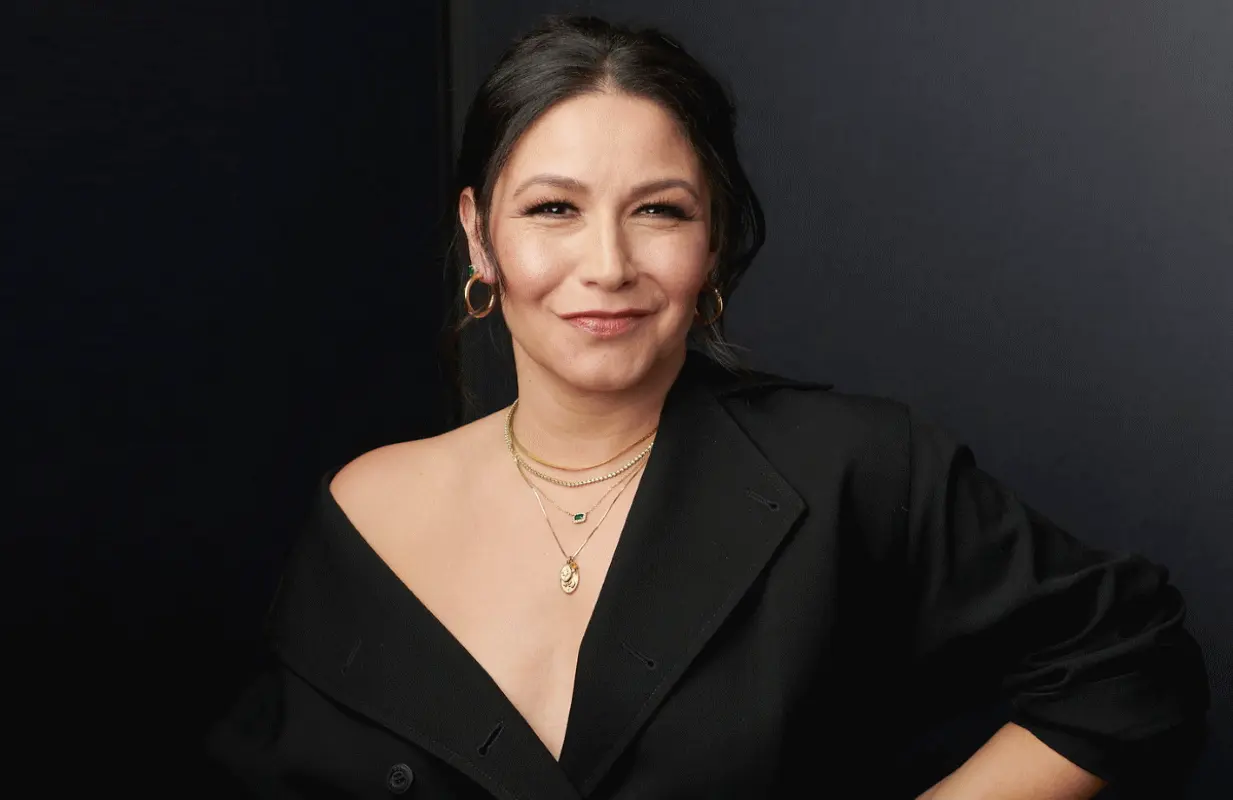Outer Range's Tamara Podemski on Playing a Native Sheriff in a Mostly White Town
-
 Tamara Podemski, photographed in Los Angeles by Jeff Vespa.
Tamara Podemski, photographed in Los Angeles by Jeff Vespa.Outer Range is a show about borderlines and the people forced to live on them. There’s the contested border between the ranches owned by two Wyoming families, and there’s the border between past and present, which is erased whenever someone falls into a black hole that’s opened on a rancher’s land. As timelines blur and secrets get unburied, the ranch families get closer to war, and the lines that kept them at a safe distance from each other threaten to collapse.
And then there’s Sheriff Joy, who’s supposed to keep the peace. She’s a Native woman and a lesbian, trying to win an upcoming election so she can keep the job she was born to do. That means borderlines run right through the middle of her life. Can she survive in her mostly white, mostly straight town? Can she be a Native woman, a sheriff, a wife, and a mother? Can she keep her community’s social fabric from disintegrating before the ranchers go wild?
Those questions guide Tamara Podemski’s captivating performance. Throughout the Prime Video series — whose entire first season is now available to stream — she suffuses Sheriff Joy with the passion and confusion of a woman who's trying to follow her unexpected calling. And with each episode, her desire to keep serving the law gets increasingly complex.
Even Podemski wasn’t prepared for where Sheriff Joy was headed. “In the beginning, I thought she was farther along in her hero journey,” she explained to Primetimer from the set of FX on Hulu’s Reservation Dogs, where she's part of the Season 2 cast. “I wanted to fight for her goodness, and I was under the illusion that she was pure good, that she was totally clear in the path that she was walking.”
That idea got shaken when she first read the scene where Sheriff Joy visits a local church service with her wife and daughter. A parishioner steps to the pulpit and pointedly denounces gay marriage, and even though it’s clear from her face that she’s unhappy about it, Joy doesn’t say or do a thing. “That was a really hard moment in her arc,” Podemski says. “In that church, it wasn’t for me to say, ‘You should’ve done this’ or ‘You should’ve done that’ about her. Because she wants that vote. I had to allow myself to see how that quest for the vote starts to pull at her.”
But as is clear from the scene below, Joy's wife Martha (MorningStar Angeline) has no problem expressing her displeasure.
Crucially, these moments come after Sheriff Joy single-handedly stops a convenience store robbery. Podemski says the two scenes speak to each other. “Seeing that [moment in the convenience store], you know that you can’t accuse her of being weak. We know that she is fierce and aware and sharp. By establishing those qualities, you can’t say she’s not standing up for herself in the church because she’s weak. There have got to be other reasons.”
That’s quite a rich conflict, and it goes even deeper when Joy attends a powwow on the reservation where she grew up. We see her watching the dancing and the celebration, but she doesn’t really participate. “You get to see Joy in her world, where she created her sense of identity and responsibility and duty,” Podemski says. “You get this chance to really see her in this fullest version of herself, and yet something’s still not right.”
Fundamentally, the sheriff is struggling to exist in the world that made her and in the world that called her to serve. “She’s starting to sever something from her past,” Podemski says. “But I don’t mean that in a political way. Sometimes there’s this idea that if you leave the reservation, you leave your culture. This is not a comment on that. This is about her not knowing how to do the work that she wants to do in a way that stays true to herself.”
In other words, how do you honor the person you were, the person you are becoming, and the elements of both that you want to protect?
Other characters on the series face similar questions, but they tend to take an all-or-nothing approach, behaving as though they have to destroy part of themselves in order to keep going. Podemski, who is a First Nations indigenous Canadian, is happy that Sheriff Joy is doing it all — going to the reservation, but also going to work every day. “That’s a very indigenous concept — the integration of it all,” she says. “It's not fixed. It’s always evolving. And if you want to look at Outer Range as an example of colonial insanity, then Joy really offers an alternate approach to the madness that is going on."
The entire first season of Outer Range is now streaming on Amazon Prime Video.
People are talking about Outer Range in our forums. Join the conversation.
Mark Blankenship has been writing about arts and culture for twenty years, with bylines in The New York Times, Variety, Vulture, Fortune, and many others. You can hear him on the pop music podcast Mark and Sarah Talk About Songs.
TOPICS: Tamara Podemski, Prime Video, Outer Range, Reservation Dogs